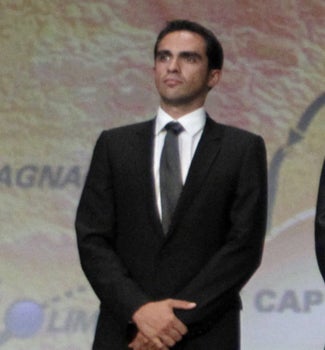Contador 'optimistic' about looming clenbuterol battle

Alberto Contador says he’s “optimistic” he will be cleared later this month when his long-running clenbuterol case finally hits the Court of Arbitration for Sport.
Contador is planning on attending the scheduled four-day hearing in Lausanne from November 21-24 that will decide his fate. If CAS rules against him, he stands to lose his 2010 Tour de France crown and serve up to a two-year ban.
But there’s growing hope within the Contador camp that he could be cleared entirely. At least that’s what Contador’s legal team is busy working on.
“I have a lot of confidence in my case. I believe it will go well,” Contador told VeloNews. “I am optimistic and I only believe in that.”
Contador’s hopes are further emboldened by recent decisions by the World Anti-Doping Agency to drop appeals in a pair of clenbuterol positives involving Mexican soccer players as well as the case of Danish cyclist Philip Nielsen, who tested positive at last year’s Tour of Mexico.
Contador has argued since day one that traces of clenbuterol entered his system while eating steaks on the Tour’s second rest day brought in from nearby Spain.
Spanish authorities supported those arguments and cleared him in February to resume racing. Contador went on to win the Giro d’Italia and finish fifth in the Tour de France. He has not since raced and is hunkering down with family and friends in El Pinto, Spain, while he awaits his day in CAS.
A recent surge in clenbuterol positives, especially in Mexico and China, has bolstered his stance that eating contaminated meat can trigger a positive.
Many of those positives come from samples tested in the WADA-approved lab in Cologne, Germany.
That lab boasts some of the most-accurate testing methods that can detect minute traces of clenbuterol. Contador’s samples as well as a recent uptick of positives involving dozens of soccer players at an Under-17 tournament in Mexico were all tested in that lab.
Contador’s sample was 50 picograms per milliliter while samples from the U-17 cases that were not prosecuted by WADA revealed that most were between 50 and 300 pg/ml. Some samples were as high as 1,300 picograms, FIFA officials said.
On October 17, WADA gave its strongest message yet on the clenbuterol issue, saying it would not appeal a case involving five Mexican footballers who tested positive after eating meat in a training camp ahead of the CONCACAF Gold Cup in June.
“WADA has subsequently received compelling evidence from a FIFA study at the U17 World Cup in Mexico that indicates a serious health problem in Mexico with regards to meat contaminated with clenbuterol,” WADA stated in a release. “This is a public health issue that is now being addressed urgently by the Mexican Government.”
Those kinds of messages are certainly helping Contador sleep easier at night as he waits for his hearing to commence.
“One year ago, when my case first appeared, they said it was impossible,” Contador said of food contamination. “Now they state it as fact.”